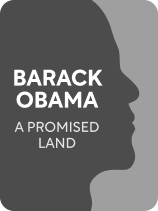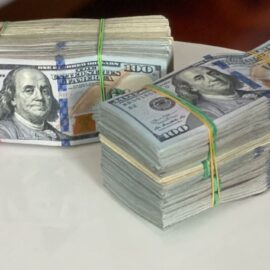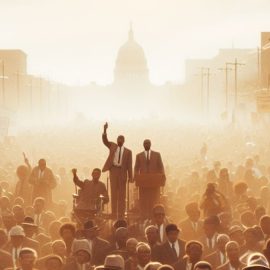

This article is an excerpt from the Shortform book guide to "A Promised Land" by Barack Obama. Shortform has the world's best summaries and analyses of books you should be reading.
Like this article? Sign up for a free trial here .
When did Barack Obama get the Democratic nomination? Why was this such an important step on his journey to president?
For Barack Obama, the Democratic nomination changed his life. After traveling and campaigning, Obama secured the nomination and was officially declared the Democratic nominee for president.
Read more about Barack Obama, the Democratic nomination, and what it meant.
Barack Obama and the Democratic National Convention
On August 27, 2008, Barack Obama took the stage at the Pepsi Center in Denver to formally accept the Democratic Party’s nomination for president of the United States. In a strikingly symbolic historical coincidence, it was the 45th anniversary of the 1963 March on Washington for Jobs and Freedom.
It represented a stunning political rise for Obama, who a mere eight years before, had not even had credentials to get on the floor of the convention. Now, he was addressing it as the nominee. For Barack, the highlight of the convention was Michelle’s electrifying speech, in which she discussed her upbringing on the South Side of Chicago, the sacrifices her parents had made to build a better life for her and her siblings, and what her unlikely journey said about what was truly possible in America.
As he stood on the stage, Barack’s thoughts were on the significance of the moment, especially for the millions of African-Americans who never thought they’d live to see such a day.
The General Election Begins
Barack Obama, a biracial kid from Hawaii and former community organizer from the South Side of Chicago, was now the Democratic Party nominee for President of the United States.
While the weight of the historic moment wasn’t lost on anyone (least of all Obama himself), the campaign had no time to rest on their laurels—there was a general election campaign to be waged and won against the Republican nominee, famed war hero and U.S. Senator John McCain of Arizona.
John McCain: Maverick-Turned-Partisan
Barack Obama secured the Democratic nomination, but who was running on the Republican side? The 73-year-old McCain’s biography was the stuff of political legend. During the Vietnam War, he’d been captured by the enemy and tortured for over five years—refusing multiple offers by the Vietnamese to be set free unless the offer was extended to his fellow POWs.
Obama had long been an admirer of McCain. The Arizona senator had repeatedly shown political independence and courage by bucking GOP orthodoxy by voting against George W. Bush’s regressive tax cuts, sponsoring a bipartisan campaign-finance reform package, and speaking out against figures on the Religious Right as “agents of intolerance.”
But Obama believed that McCain had shamelessly pandered to the party’s far-right flank in order to win the 2008 Republican nomination—effectively selling his principles out for political gain. The onetime maverick was now little more than a standard-issue Republican. The Obama team was determined to make sure that the country also saw him that way.
The Overseas Campaign Trip
To counter claims by the McCain campaign that he was inexperienced in foreign policy and ill-prepared to serve as commander-in-chief, Obama and his team arranged a June 2008 foreign trip to Israel, France, the UK, Iraq, and Afghanistan.
In Afghanistan, where U.S. troops had been present since 2001, Obama saw to his dismay that the U.S.-backed leader Hamid Karzai held little real power outside the capital of Kabul. Worse, his government lacked legitimacy in the eyes of the country’s rural population. U.S. troops on the ground, meanwhile, had been placed in an impossible situation and deployed in numbers too small to contain the violence that was quickly engulfing the country.
In Iraq, Obama found a similar situation, with the U.S.-installed provisional government barely keeping the security situation stable as Sunni-Shi’ite sectarian tensions raged. In a private conversation, Iraqi Prime Minister Nouri al-Maliki agreed with Obama’s position that it was time for the U.S. to begin a phased withdrawal of troops.
General David Petraeus, commander of the U.S. forces in Iraq, disagreed with the Democratic candidate’s position. But Obama was already beginning to think like a president. He knew that as commander-in-chief, he would have to make tough decisions, weigh consequences and trade-offs, and act in the best interests of the country—even if that meant overriding the opinions of experts on the ground like Petraeus.
The trip was a rousing success in terms of campaign optics, with the media agreeing that he “looked presidential.” But Obama was becoming concerned with more important things than the optics. With a strong polling lead over McCain as the summer wore on, he knew there was a growing chance that he would win.
He couldn’t afford to just look like a president. He would have to be one. For Barack Obama, the Democratic nomination was just the beginning.

———End of Preview———
Like what you just read? Read the rest of the world's best book summary and analysis of Barack Obama's "A Promised Land" at Shortform .
Here's what you'll find in our full A Promised Land summary :
- How Barack Obama went from relative obscurity to the first Black president
- What principles guided his political leadership style
- Why Obama retained an unshakable faith in the potential and promise of America






